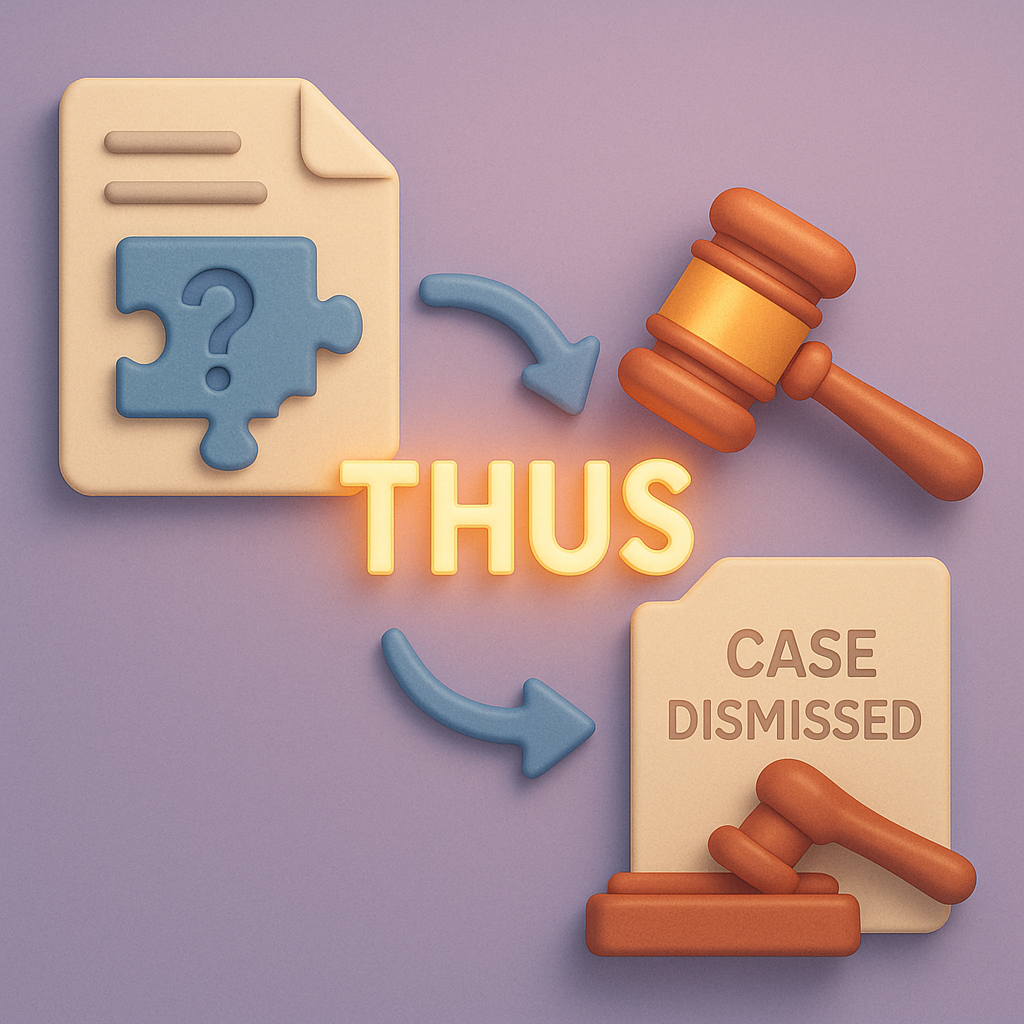Thus
Definition
Thus is an adverb used to mean "as a result," "in this way," or "accordingly." It is used to connect statements in logical or explanatory contexts.
Parts of Speech
- Adverb
Pronunciation
American English
- IPA Pronunciation: /ðʌs/
- Respelling: THUSS
British English
- IPA Pronunciation: /ðʌs/
- Respelling: THUSS
Etymology
The word "thus" originates from Old English "þus," meaning "in this way," and is related to Proto-Germanic "*thus" and Proto-Indo-European "*to," meaning "this" or "that." It has retained its meaning in modern English.
Derivatives
- Thusly (adverb, rare)
- Thusness (noun, philosophical term)
- Thus-and-so (phrase)
- Thusly-stated (adjective, informal)
- Thus-related (adjective, rare)
Synonyms
- Therefore
- Hence
- Consequently
Antonyms
- None
Usage
The adverb "thus" is often used in formal writing and speech to indicate a logical connection or result. For example, "The evidence was incomplete; thus, the case was dismissed."
Related Terms
- Therefore: A term used to show logical consequence.
- Hence: Indicates a result or conclusion drawn from prior statements.
- So: A less formal word to indicate consequence or result.
Detailed Definitions
Adverb
- As a result or consequence: Used to introduce a conclusion or logical outcome.
- Example: "He was overqualified for the position; thus, he was not hired."
- In this way or manner: Describes the method or manner of something.
- Example: "Arrange the items thus to save space."
- To this degree or extent (archaic): Indicates a particular measure or extent.
- Example: "The king’s decree went thus, 'Let peace reign in the kingdom.'
thus



🇨🇳 Chinese (Mandarin)
- 因此
- IPA Pronunciation: /jin˥˩ t͡ɕʰi˥˩/
- English respelling: yīncǐ
- 如此
- IPA Pronunciation: /ɻu˨˩˦ t͡ɕʰɹ̩˥˩/
- English respelling: rúcǐ
🇮🇳 Hindi
- इस प्रकार
- IPA Pronunciation: /is prəkaːr/
- English respelling: is prakaar
- अतः
- IPA Pronunciation: /ət̪əh/
- English respelling: atah
🇪🇸 Spanish
- Así
- IPA Pronunciation: /aˈsi/
- English respelling: así
- Por lo tanto
- IPA Pronunciation: /poɾ lo ˈtanto/
- English respelling: por lo tanto
🇫🇷 French
- Ainsi
- IPA Pronunciation: /ɛ̃si/
- English respelling: ainsi
- Donc
- IPA Pronunciation: /dɔ̃k/
- English respelling: donc
🇸🇦 Arabic (Modern Standard Arabic)
- وبذلك
- IPA Pronunciation: /wa biðalik/
- English respelling: wa bidhalik
- هكذا
- IPA Pronunciation: /hakadha/
- English respelling: hakadha
🇧🇩 Bengali
- এই পর্যায়ে
- IPA Pronunciation: /ei pɔrjaje/
- English respelling: ei poryaye
- অতএব
- IPA Pronunciation: /ɔtoebo/
- English respelling: otoeb
🇷🇺 Russian
- Таким образом
- IPA Pronunciation: /ˈtakʲɪm ɐˈbrazəm/
- English respelling: takim obrazom
- Следовательно
- IPA Pronunciation: /sʲlʲɪdəvɐˈtʲelʲnə/
- English respelling: sledovatel'no
🇵🇹 Portuguese
- Assim
- IPA Pronunciation: /ɐˈsĩɰ̃/
- English respelling: assim
- Portanto
- IPA Pronunciation: /puɾˈtɐ̃tu/
- English respelling: portanto
🇮🇩 Indonesian
- Jadi
- IPA Pronunciation: /ˈd͡ʒadi/
- English respelling: jadi
- Dengan demikian
- IPA Pronunciation: /dengan demikian/
- English respelling: dengan demikian
🇩🇪 German
- So
- IPA Pronunciation: /zoː/
- English respelling: so
- Daher
- IPA Pronunciation: /ˈdaːɐ̯/
- English respelling: daher
🇯🇵 Japanese
- したがって
- IPA Pronunciation: /ɕitaɡatte/
- English respelling: shitagatte
- だから
- IPA Pronunciation: /dakara/
- English respelling: dakara
🇻🇳 Vietnamese
- Do đó
- IPA Pronunciation: /ɗo ɗɔ˧ˀ˨ʔ/
- English respelling: do đó
- Vì thế
- IPA Pronunciation: /viː˧ˀ˨ʔ te/
- English respelling: vì thế
🇰🇷 Korean
- 그래서
- IPA Pronunciation: /ɡɯɾɛsʰʌ/
- English respelling: geuraeseo
- 따라서
- IPA Pronunciation: /tʰaɾaso/
- English respelling: ttaraseo
🇹🇷 Turkish
- Böylece
- IPA Pronunciation: /bøjˈlet͡ʃe/
- English respelling: böylece
- Dolayısıyla
- IPA Pronunciation: /dolajɯsɯjla/
- English respelling: dolayısıyla
🇵🇰 Urdu
- اس طرح
- IPA Pronunciation: /ɪs tərɑːh/
- English respelling: is tarah
- یوں
- IPA Pronunciation: /juːn/
- English respelling: yun





